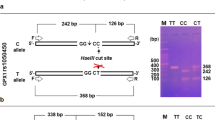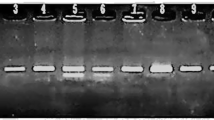Abstract
Purpose
The aim of this study was undertaken to investigate the association of 78-kDa glucose-regulated protein (GRP78) gene promoter polymorphisms with risk of asthenozoospermia (AZS) men. In addition, we performed association analysis between GRP78 promoter mutations and serum GRP78 level in asthenozoospermia.
Methods
The study population comprised 400 subjects with AZS patients and 400 healthy controls. We assessed GRP78 rs3216733, rs17840761, and rs17840762 polymorphisms by using Snapshot SNP genotyping assays; serum GRP78 level was measured by enzyme-linked immunosorbent assay (ELISA). Semen quality was assessed by computer-assisted semen analysis.
Results
We found that rs3216733 was associated with increased risk of AZS (Gd vs. dd: adjusted OR = 1.42, 95% CI, 1.06–1.93, P = 0.020; Gd/GG vs. dd: adjusted OR = 1.43, 95% CI, 1.08–1.91, P = 0.013; G vs. d adjusted OR = 1.26, 95% CI, 1.03–1.56, P = 0.027). The haplotype analyses showed the frequency of G-C-C haplotype was significantly higher in AZS (P = 0.026). The percentage of progressive motility sperm was lower in the asthenozoospermic men with Gd and Gd/GG genotypes than dd genotype (P = 0.003). Moreover, the serum GRP78 levels were significantly lower in rs3216733 Gd/GG genotypes compared with the dd genotype (P < 0.001).
Conclusion
Our findings suggest that rs3216733 Gd/GG genotypes contribute to poor sperm motility, probably by decreasing the level of GRP78.


Similar content being viewed by others
References
de Kretser DM. Male infertility. Lancet. 1997;349(9054):787–90.
Zhang SH, Zhang JH, Ding XP, Zhang S, Chen HH, Jing YL. Association of polymorphisms in tektin-t gene with idiopathic asthenozoospermia in Sichuan, China. J Assist Reprod Genet. 2016;33(2):181–7.
Song P, Zou S, Chen T, Chen J, Wang Y, Yang J, et al. Endothelial nitric oxide synthase (eNOS) T-786C, 4a4b, and G894T polymorphisms and male infertility: study for idiopathic asthenozoospermia and meta-analysis. Biol Reprod. 2015;92(2):38.
Xu X, Sha YW, Mei LB, Ji ZY, Qiu PP, Ji H, et al. A familial study of twins with severe asthenozoospermia identified a homozygous SPAG17 mutation by whole-exome sequencing. Clin Genet. 2018;93(2):345–9.
Bracke A, Peeters K, Punjabi U, Hoogewijs D, Dewilde S. A search for molecular mechanisms underlying male idiopathic infertility. Reprod BioMed Online. 2018;36(3):327–39.
Yu B, Chen J, Liu D, Zhou H, Xiao W, Xia X, et al. Cigarette smoking is associated with human semen quality in synergy with functional NRF2 polymorphisms. Biol Reprod. 2013;89(1):5.
Gaskins AJ, Chavarro JE. Diet and fertility: a review. Am J Obstet Gynecol. 2018;218(4):379–89.
Vigano P, Chiaffarino F, Bonzi V, Salonia A, Ricci E, Papaleo E, et al. Sleep disturbances and semen quality in an Italian cross sectional study. Basic Clin Androl. 2017;27:16.
Jahantigh D, Hosseinzadeh Colagar A, Salimi S. Genetic polymorphisms and haplotypes of the DJ-1 gene promoter associated with the susceptibility to male infertility. J Assist Reprod Genet. 2017;34(12):1673–82.
Franken DR, Oehninger S. Semen analysis and sperm function testing. Asian J Androl. 2012;14(1):6–13.
Liu FJ, Liu X, Han JL, Wang YW, Jin SH, Liu XX, et al. Aged men share the sperm protein PATE1 defect with young asthenozoospermia patients. Hum Reprod. 2015;30(4):861–9.
Zuccarello D, Ferlin A, Garolla A, Pati MA, Moretti A, Cazzadore C, et al. A possible association of a human tektin-t gene mutation (A229V) with isolated non-syndromic asthenozoospermia: case report. Hum Reprod. 2008;23(4):996–1001.
Navarro-Costa P, Plancha CE, Goncalves J. Genetic dissection of the AZF regions of the human Y chromosome: thriller or filler for male (in)fertility? J Biomed Biotechnol. 2010;2010:936569.
McAuliffe ME, Williams PL, Korrick SA, Dadd R, Perry MJ. The association between sperm sex chromosome disomy and semen concentration, motility and morphology. Hum Reprod. 2012;27(10):2918–26.
Zhang S, Wang QM, Ding XP, Wang T, Mu XM, Chen ZY. Association of polymorphisms in PATE1 gene with idiopathic asthenozoospermia in Sichuan, China. J Reprod Immunol. 2016;118:54–60.
Lee AS. The ER chaperone and signaling regulator GRP78/BiP as a monitor of endoplasmic reticulum stress. Methods. 2005;35(4):373–81.
Lachance C, Fortier M, Thimon V, Sullivan R, Bailey JL, Leclerc P. Localization of Hsp60 and Grp78 in the human testis, epididymis and mature spermatozoa. Int J Androl. 2010;33(1):33–44.
Lachance C, Bailey JL, Leclerc P. Expression of Hsp60 and Grp78 in the human endometrium and oviduct, and their effect on sperm functions. Hum Reprod. 2007;22(10):2606–14.
Marin-Briggiler CI, Gonzalez-Echeverria MF, Munuce MJ, Ghersevich S, Caille AM, Hellman U, et al. Glucose-regulated protein 78 (Grp78/BiP) is secreted by human oviduct epithelial cells and the recombinant protein modulates sperm-zona pellucida binding. Fertil Steril. 2010;93(5):1574–84.
Endo S, Hiramatsu N, Hayakawa K, Okamura M, Kasai A, Tagawa Y, et al. Geranylgeranylacetone, an inducer of the 70-kDa heat shock protein (HSP70), elicits unfolded protein response and coordinates cellular fate independently of HSP70. Mol Pharmacol. 2007;72(5):1337–48.
Thuerauf DJ, Marcinko M, Gude N, Rubio M, Sussman MA, Glembotski CC. Activation of the unfolded protein response in infarcted mouse heart and hypoxic cultured cardiac myocytes. Circ Res. 2006;99(3):275–82.
Hsu WC, Wang HK, Lee LC, Fung HC, Lin JC, Hsu HP, et al. Promoter polymorphisms modulating HSPA5 expression may increase susceptibility to Taiwanese Alzheimer’s disease. J Neural Transm (Vienna). 2008;115(11):1537–43.
Winder T, Bohanes P, Zhang W, Yang D, Power DG, Ning Y, et al. GRP78 promoter polymorphism rs391957 as potential predictor for clinical outcome in gastric and colorectal cancer patients. Ann Oncol. 2011;22(11):2431–9.
Zhu X, Zhang J, Fan W, Wang F, Yao H, Wang Z, et al. The rs391957 variant cis-regulating oncogene GRP78 expression contributes to the risk of hepatocellular carcinoma. Carcinogenesis. 2013;34(6):1273–80.
Jia Y, Tong Y, Min L. Significance of functional GRP78 polymorphisms in predicting the onset of type 2 diabetic peripheral neuropathy in Chinese population. Neurol Res. 2015;37(8):683–7.
Lobo V, Rao P, Gajbhiye R, Kulkarni V, Parte P. Glucose regulated protein 78 phosphorylation in sperm undergoes dynamic changes during maturation. PLoS One. 2015;10(11):e0141858.
Shen S, Wang J, Liang J, He D. Comparative proteomic study between human normal motility sperm and idiopathic asthenozoospermia. World J Urol. 2013;31(6):1395–401.
Zhu X, Li DP, Fan WG, Lin MC, Wang JL, Lin SQ, et al. Lack of association between the GRP78 polymorphisms in the promoter and 3’ UTR and susceptibility to chronic HBV infection in a Chinese Han population. BMC Med Genet. 2010;11:83.
Chen CM, Wu YR, Hu FJ, Chen YC, Chuang TJ, Cheng YF, et al. HSPA5 promoter polymorphisms and risk of Parkinson’s disease in Taiwan. Neurosci Lett. 2008;435(3):219–22.
Daly MJ, Rioux JD, Schaffner SF, Hudson TJ, Lander ES. High-resolution haplotype structure in the human genome. Nat Genet. 2001;29(2):229–32.
Meinderts SM, Sins JWR, Fijnvandraat K, Nagelkerke SQ, Geissler J, Tanck MW, et al. Nonclassical FCGR2C haplotype is associated with protection from red blood cell alloimmunization in sickle cell disease. Blood. 2017;130(19):2121–30.
Kakiuchi C, Ishiwata M, Nanko S, Kunugi H, Minabe Y, Nakamura K, et al. Functional polymorphisms of HSPA5: possible association with bipolar disorder. Biochem Biophys Res Commun. 2005;336(4):1136–43.
Robertson D. Racially defined haplotype project debated. Nat Biotechnol. 2001;19(9):795–6.
Funding
This work was supported by grants from the National Natural Science Foundation of China (No. 81560461), Research Key Laboratory of the Right River Valley Characteristics of Guangxi University (kfkt2017022).
Author information
Authors and Affiliations
Corresponding author
Ethics declarations
This study was approved by the ethics review board of the Affiliated Hospital of Youjiang Medical University for Nationalities, consistent with provisions of the Declaration of Helsinki. Voluntary written informed consent was obtained.
Conflict of interest
The authors declare that they have no competing interests.
Rights and permissions
About this article
Cite this article
Qin, H., Wang, R., Pang, X. et al. Association of GRP78 promoter polymorphisms and serum GRP78 level with risk of asthenozoospermia. J Assist Reprod Genet 35, 2223–2231 (2018). https://doi.org/10.1007/s10815-018-1316-0
Received:
Accepted:
Published:
Issue Date:
DOI: https://doi.org/10.1007/s10815-018-1316-0




